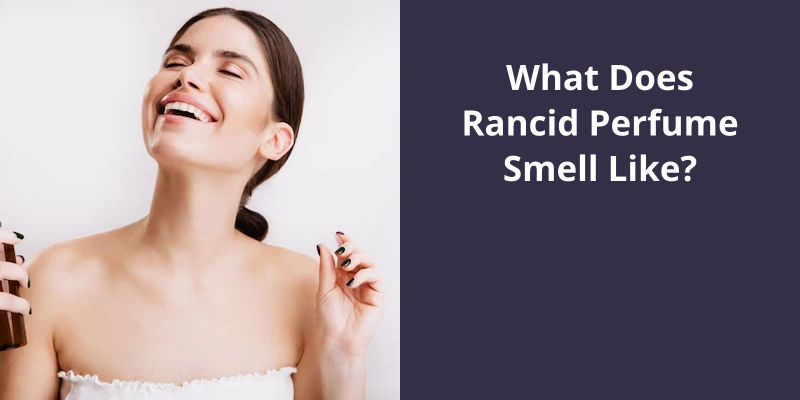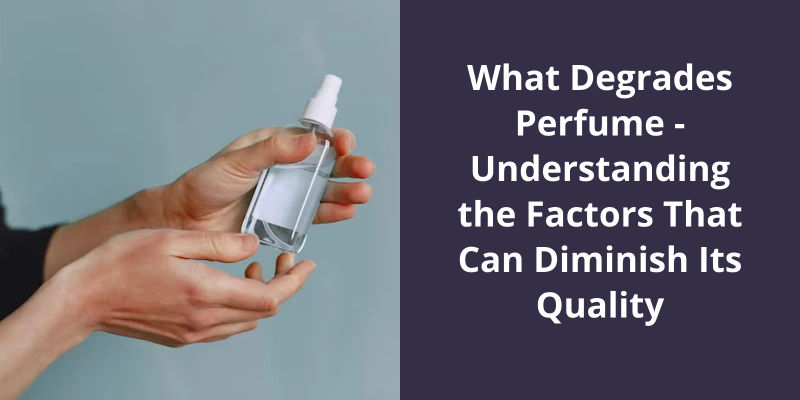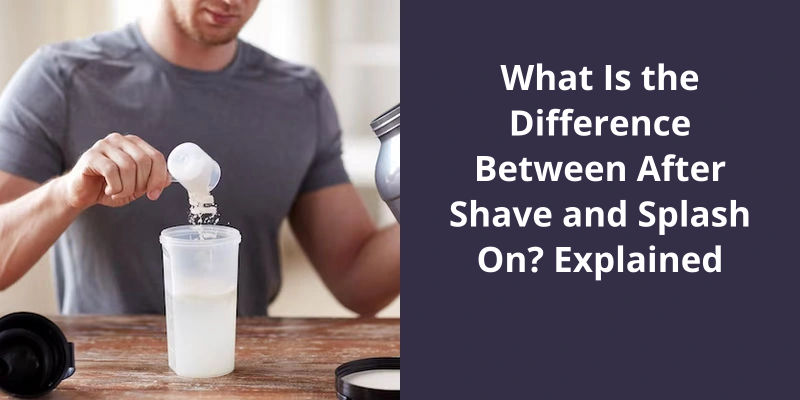Rancid perfume typically emits a sour or unpleasant smell due to its spoiled or degraded state. This alteration in scent is usually caused by exposure to heat or light, storing the perfume for long periods, or degrading natural ingredients. The once pleasant fragrance may now carry a vinegar-like smell, a sharp, strong alcohol scent, or even a smell similar to cooking oil. Consequently, how a rancid perfume smells can vary greatly and depends on its initial fragrance notes and the degradation process it has undergone.

Do They Put Bad Smells in Perfume?
Do they put bad smells in perfume? The answer might surprise you. In the fascinating world of perfumery, there’s a space in every perfume lab devoted to materials with strong, reeking odors, aptly named “the stinky room.”. This is where perfumers explore and experiment with notes that can evoke less desirable scents. Next to the fragrant roses and sweet vanillas in a perfumers palette, they find inspiration in elements reminiscent of dirty hair, musty fur, burnt toast, or decaying fruit.
These peculiar notes, such as costus, musks, and civet, have their own place of honor in perfumery. They’re often used in tiny amounts to add complexity and depth to a fragrance, creating an intriguing olfactory experience. Just as an artist might use dark and unsettling shades to create contrast and captivate the viewer, perfumers utilize the less pleasant smells to add character to their compositions.
These “bad smells” aren’t included in perfume to make it repulsive. Instead, they serve as essential building blocks, enhancing the overall fragrance and adding depth and dimension to the final product. It’s all about balance and harmony, as a well-crafted perfume should evoke a range of emotions and sensations, not just sweetness and light.
In fact, some perfume enthusiasts appreciate the complexity and intriguing nature of these unconventional smells. They seek out perfumes that push the boundaries of traditional fragrance, offering a unique and memorable experience. Rancid perfume, for example, might have hints of spoiled fruit or funky cheese, creating an unusual yet intriguing scent that captivates the senses.
The History of Perfume and It’s Use of Unconventional Smells
Perfume has a rich history that dates back centuries and has evolved in various ways. Traditionally, perfumes were created using natural ingredients like flowers, spices, and herbs to produce pleasant and appealing scents. However, in recent times, there’s been a growing interest in experimenting with unconventional smells, including the use of rancid scents in perfumes.
While this may sound peculiar, the incorporation of rancid or unpleasant smells in perfume isn’t a new concept. It’s a way for perfumers to challenge traditional notions of beauty and explore the boundaries of art and fragrance. These unconventional scents can evoke different emotions and reactions from individuals, making them a unique and thought-provoking olfactory experience.
Perfumers often blend rancid or decayed notes with more pleasant ones to create a complex and multidimensional fragrance. This can result in perfumes that have a distinct, intriguing aroma, pushing the boundaries of what’s considered traditionally appealing.
However, it’s important to note that rancid scents in perfumes aren’t for everyone, as personal preferences play a significant role in fragrance choices. What one person finds repulsive, another may find intriguing or even alluring.
Ultimately, the use of unconventional smells in perfumes is a bold and creative approach that challenges the norms of fragrance composition. It allows for exploration and innovation in the world of perfumery, giving individuals the opportunity to experience scents in a new and unexpected way.
These natural ingredients are carefully harvested and extracted to capture their unique scents. Once collected, essential oils are often blended together to create complex and captivating fragrance profiles. In addition to plant extracts, synthetic compounds are also utilized to enhance and extend the desired scent. The art of perfumery lies in the precise combination of these ingredients, resulting in the wide array of captivating fragrances we encounter in the world of perfumes.
How Do Perfumes Get Their Smell?
Perfumes, famed for their captivating scents, derive their aromatic qualities from a multitude of sources. Amongst the most familiar ingredients, fragrant plants and flowers reign supreme. Treasured essences like sandalwood and roses emit delightful odors due to the presence of essential oils stored within minuscule sacs. These sacs act as reservoirs of natures captivating fragrances. In the grand pursuit of crafting perfumes, no part of these precious plants goes to waste. Flowers, roots, and leaves all find their rightful place in the perfumers toolkit.
Flowers, with their resplendent beauty, serve as a wellspring of inspiration for perfumers. By harnessing the scented prowess locked within their petals, master artisans create ethereal fragrances that have the power to transport our senses. Whether it’s the heady allure of jasmine, the delicate sweetness of lavender, or the intoxicating bouquet of rose, flowers offer an unparalleled range of scents for perfumery.
Roots, often neglected in our daily lives, yield surprising olfactory wonders. Underground repositories of natures essence, they possess a distinct earthiness that lends a unique character to perfumes. Vetiver, with it’s deep and smoky scent, or the warm and spicy allure of ginger, are prime examples of how roots contribute indispensable notes to the symphony of fragrances.
Leaves, the life-giving powerhouses of plants, harbor their own share of aromatic treasures. Their vibrant green appearance belies the olfactory magic they contain. Fragrant leaves such as patchouli or peppermint bring freshness and vitality to perfumes. Each leaf retains a deeply nuanced scent that can evoke emotions and memories, making them indispensable for perfumery.
In the art of perfume creation, every plant part plays a vital role, as perfumers strive to harness the unparalleled scents gifted by nature. By extracting these aromas and skillfully blending them, they create unforgettable olfactory experiences. From the mesmerizing depths of the sandalwood tree to the delicate petals of a rose, perfumers weave together an intricate tapestry of scents that captivate and delight.
The Art of Creating Unique and Personalized Fragrances
- Understanding fragrance families
- Exploring different essential oils and ingredients
- Mixing and blending scents
- Creating your own signature fragrance
- Experimenting with different notes and accords
- Learning about the chemistry of perfume making
- Understanding the psychology of scent
- Customizing fragrances for different occasions
- Discovering the art of layering scents
- Creating unique perfume bottles and packaging
As the fragrance ages and comes into contact with oxygen, it’s molecules can undergo changes that affect it’s scent. Huclier explains that this oxidation process, caused by the oxygen in the air, can result in a slightly sour smell, particularly in the top notes of the perfume. Additionally, an oxidized perfume can sometimes emit a faint metallic scent.
What Does Oxidized Perfume Smell Like?
What does oxidized perfume smell like? You can tell if a perfume has expired when the smell is slightly sour, especially as the top notes oxidize. This can have a slight metallic scent. “Oxygen within the air can alter some of the molecules present in a fragrance over time,” says Huclier.
As perfume ages and becomes exposed to air and light, it’s composition can change, leading to an unpleasant smell. These changes in scent occur due to the degradation of the perfumes components, such as the essential oils and aroma compounds. The oxidation process can lead to the formation of volatile compounds that give the perfume an off-putting odor.
When a perfume goes rancid, it can lose it’s original charm and become quite nauseating. The smell may be reminiscent of rotten eggs or spoiled food, with a pungent and overpowering quality. This occurs because the organic molecules in the fragrance break down and release foul-smelling byproducts. The sour, metallic tinge often associated with expired perfume is a result of this degradation process.
It’s important to note that not all perfumes will undergo oxidation in the same way or at the same rate. Factors such as the fragrances composition, storage conditions, and exposure to heat and sunlight can all influence the speed at which a perfume may turn rancid. It’s always best to store perfumes in cool, dark places to extend their shelf life and preserve their original scent. Regularly checking for any changes in smell can help prevent the use of expired perfume, ensuring a more enjoyable olfactory experience.
Tips for Properly Storing Perfume to Prevent Oxidation
- Store perfume in a cool and dry place.
- Avoid direct sunlight, as it can speed up the oxidation process.
- Keep the perfume bottle tightly closed when not in use to minimize air exposure.
- Avoid storing perfume in areas with high humidity, like bathrooms.
- Store perfume away from heat sources, such as radiators or stoves.
- Avoid storing perfume in the refrigerator, as temperature fluctuations can affect the scent.
- Consider using a perfume atomizer to transfer perfume to smaller, airtight containers.
- Keep perfume bottles upright to prevent leakage and minimize contact with air.
- Consider wrapping perfume bottles in a soft cloth or tissue to provide extra protection.
- Rotate perfumes regularly to ensure they’re used before they expire.
As consumers become more conscious about the products they use, questions about the safety of perfumes have emerged. It’s a worrisome fact that a vast majority of perfume formulations in today’s market consists of harmful synthetic chemicals. These substances, which include carcinogens, respiratory irritants, and neurotoxins, raise concerns about the potential risks associated with wearing perfumes. Furthermore, the presence of narcotics, hormone sensitizers, and other detrimental ingredients adds to the complexities of the issue.
Do Perfumes Have Bad Chemicals?
What Does Rancid Perfume Smell Like?
Perfumes have long been used to enhance personal scent and leave a lasting impression. However, not all perfumes are created equal, and many contain harmful chemicals that can pose potential health risks. Today, the majority of perfume formulations are composed of synthetic chemicals, with over 95% falling into this category. These chemicals can range from carcinogenic substances to respiratory irritants, neurotoxins, and narcotics.
These chemicals can trigger allergic reactions, asthma attacks, or other respiratory issues in individuals who’re sensitive or susceptible to such substances. The inhalation of these irritants can lead to shortness of breath, wheezing, and other breathing difficulties, which can be particularly problematic for individuals with pre-existing respiratory conditions.
Another group of harmful chemicals found in perfumes are neurotoxins. These substances have the potential to affect the nervous system, causing a range of symptoms such as headaches, dizziness, nausea, and even long-term neurological damage. Neurotoxins can interfere with the normal functioning of the brain and may have adverse effects on cognitive abilities and overall well-being.
Furthermore, some perfume ingredients act as narcotics or hormone sensitizers. Narcotics have the ability to cause addiction or dependence, which can be concerning when used in fragrances. Hormone sensitizers, on the other hand, can disrupt the delicate balance of hormones in the body, potentially leading to hormonal imbalances and related health issues.
Alternatives to Synthetic Perfumes That Use Natural, Non-Toxic Ingredients.
- Lavender essential oil
- Vanilla extract
- Citrus zest
- Rose water
- Sandalwood essential oil
- Jasmine extract
- Peppermint leaves
- Chamomile flowers
- Ylang-ylang essential oil
- Eucalyptus leaves
- Bergamot oil
However, it isn’t just exposure to oxygen that can cause perfume to become spoiled. Other factors such as heat, sunlight, and contaminants can also contribute to the degradation of the fragrance.
What Does Spoiled Perfume Smell Like?
What does rancid perfume smell like? Have you ever wondered what happens to your beloved fragrance when it starts to go bad? According to perfume experts, spoiled perfume can emit a range of unpleasant odors. One common observation is that the scent tends to become oxidized, resulting in a sour, acidic, or metallic smell. The fragrance may also develop notes of plastic, giving it an off-putting and unnatural aroma.
It seems that excessive exposure to oxygen is the culprit behind these undesirable transformations. As oxygen infiltrates your perfume bottle, it interacts with the fragrance molecules, leading to molecular changes that alter the overall scent profile. This oxidation process can give rise to various pungent and disagreeable odors that differ from the original fragrance.
So, be cautious with how you store your fragrance collection. Keep your perfumes away from excessive heat, sunlight, and air exposure to preserve their longevity and integrity.
How to Properly Store Perfume to Prevent Spoilage
Properly storing perfume is essential to prevent spoilage and maintain it’s scent quality. Perfume should be stored in a cool, dry place, away from direct sunlight and extreme temperatures.
Avoid storing perfume in a bathroom or any area with high humidity, as moisture can break down the fragrance molecules and affect the scent. Instead, opt for a closet or a drawer in your bedroom.
It’s also crucial to keep perfume bottles tightly sealed when not in use to prevent air exposure, which can lead to oxidation and a rancid smell. Make sure the cap is always securely fastened.
Additionally, refrain from storing perfumes near sources of heat or chemicals, as they can cause chemical reactions and alter the fragrance. Keep them away from windowsills, radiators, and other potentially damaging substances.
Following these storage guidelines will help preserve the quality and longevity of your perfume, allowing you to enjoy the delightful scent for an extended period.
Source: Does Perfume Actually Expire? We Asked Professional …
Conclusion
As a scent ages and it’s top notes oxidize, a slightly sour and metallic aroma can emerge, alerting the user to the expiration of the fragrance. This subtle transformation in scent serves as a reminder to regularly assess the freshness and quality of our perfume collection, reassuring us that our olfactory experiences remain delightful and unspoiled.





